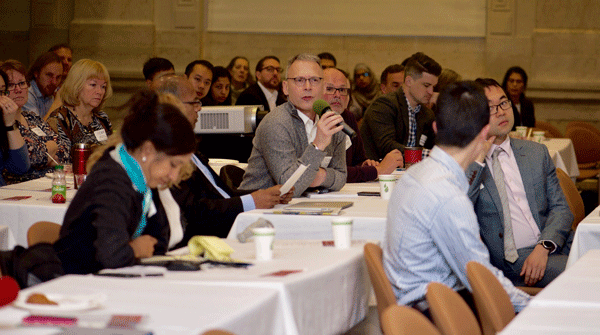By Tara Fernandez, Enoli De Silva, Tseday Tegegn, and Erika Siren
The Centre for Blood Research hosted the 6th Annual Norman Bethune Symposium this year, which brought together a host of international speakers, physicians, academics and students to discuss recent advances in blood research. This yearly event pays tribute to Dr. Bethune’s ambitious and tireless efforts in creating one of the first mobile blood transfusion units on the battlefields of the Spanish Civil War, in delivering care at the frontlines in the battles of China, and promoting universal health care.
Transfusion medicine has progressed by leaps and bounds since Norman Bethune’s efforts in the 1930s. Among this year’s engaging speakers, Dr. Peter Newman from the Blood Center of Wisconsin, described the allelic polymorphisms in GPIIIa that could lead to alloimmune disorders such as neonatal alloimmune thrombocytopenia. He highlighted some of the many challenges in managing and treating such platelet disorders and potential strategies to tackle them using CRISPR-mediated genome editing.
“Transfusion medicine has progressed by leaps and bounds since Norman Bethune’s efforts in the 1930s.”
Following on from Norman Bethune’s life-saving attempts on the frontline, Dr. Heather Pidcoke described novel techniques of platelet transfusion for effective resuscitation from trauma. In addition, Dr. Shibani Pati from the Blood Systems Research Institute, presented her research on how the transfusion of a combination of platelets, plasma and red blood cells provides an added survival benefit by playing a reparative function on the vascular endothelium.
After a refreshing mid-morning coffee break, two specially selected abstracts were presented. Emel Islamzada, a graduate student in UBC’s Department of Mechanical Engineering, showed us the application of a chromatographic based microfluidic technique to separate deformed malaria infected red blood cells (RBCs) from their healthy counterparts. This technology monitors biophysical changes that can be used for diagnosis, prognosis and treatment of malaria. Emel’s poster presentation also received the Best Poster Prize from the day’s competition, highlighting her fantastic research achievements. Next, Dr. Andrew Shih from Vancouver General Hospital described the use of social media platforms for educating healthcare professionals on best practices in transfusion medicine. Dr. Shih commented after his talk that he valued the symposium as an opportunity to bring people together from different specialties in transfusion medicine. He hopes to present his ongoing efforts to develop an online curriculum map for transfusion medicine again at future events. The CBR’s own Dr. Hugh Kim then took the platform, presenting data on the importance of oral hygiene, describing some of the PF4-mediated systemic effects of periodontitis.
New York Blood Centre’s Dr. Mohandas Narla, spoke about RBCs storage lesions and excited us about current accomplishments in in vitro RBC production research. Changing gears from clinical research perspectives, Dr. James Piret, an investigator at UBC Michael Smith Laboratories, gave an overview on the advantages and limitations of Raman spectroscopy to analyze biologics. The morning session was concluded with CBR’s traditional “Shot-gun” talks from the many poster presenters who encouraged audience members to discuss their work during the lunch break.
The afternoon session began with a beautifully assembled talk by Dr. Jean Wang from Toronto’s Princess Margaret Cancer Centre. Dr. Wang treated the audience to a closer look at Norman Bethune’s life and accomplishments. In what has become a tradition of CBR symposia, researchers in the audience were treated next to a powerful talk by a recipient of blood-related care.
In between the fascinating and thought-provoking presentations by keynote speakers, the perspectives from a brave patient captured the hearts of symposium attendees. Krista Klokeid, a recipient of seemingly endless transfusions during the course of her illness, spoke of her tumultuous journey on the road to recovery. The trials she faced while fighting her undiagnosed disorder shed light on the difficulties facing patients such as herself and was inspirational for the many doctors and researchers in the room who have dedicated their lives to helping people such as Krista.
“The perspectives from a brave patient captured the hearts of symposium attendees.”
The first half of the afternoon ended with a presentation by Dr. Jacqueline Trudeau, a clinical assistant Professor and anesthesiologist located at the Vancouver General Hospital. Dr. Trudeau discussed the promise of using ROTEM instrumentation to probe coagulation in a clinical environment. Currently, ROTEM is being piloted for use in tracking fibrinogen needs of patients in close to real time.
The last invited speaker of the afternoon was a CBR favourite, Dr. Mark Yazer from the University of Pittsburgh. A hematopathologist by training, Mark currently serves as both a Professor of Pathology and Medical Director of the the Centralized Transfusion Service in Pittsburgh. Mark regaled us with not only his fascinating talk on transitioning to whole blood for trauma patients, but also his wide-spread takedown of most of our Canadian sports teams (some jabs well-deserved). The formal part of the symposium ended with a few words on the future of transfusion medicine from NBS organizer Dr. Dana Devine. Perhaps her most interesting comments came from the involvement of technology in the future of transfusion medicine. According to Dr. Devine, using smart systems for managing blood products and big data analytics for tracking their associated statistics will have a significant potential in rapidly changing the face of transfusion medicine. This is especially exciting for the CBR, as many of our researchers are directly involved in developing such innovative strategies.
“Using smart systems for managing blood products and big data analytics for tracking their associated statistics will have a significant potential in rapidly changing the face of transfusion medicine.”
As the sun set on another remarkable Norman Bethune Symposium, CBR’s director, Dr. Ed Conway expressed his gratitude to all the attendees, volunteers, organizers and sponsors in helping to make the day a tremendous success. Gathering to socialize over drinks and nibbles, it was clear from discussions around the room that, like Norman Bethune, the blood research community will continually persevere in finding new ways of helping patients everywhere.



